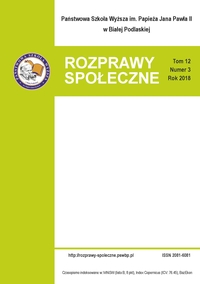Rozwijanie empatii jako forma przeciwdziałania przemocy rówieśniczej w środowisku szkolnym
The development of empathy as a form of counteracting peer violence in the school environment
Author(s): Renata KopyśSubject(s): School education, Studies in violence and power
Published by: Państwowa Szkoła Wyższa im. Papieża Jana Pawła II w Białej Podlaskiej
Keywords: empathy; active listening; drama; Rosenberg’s “The Non-Violence Arrangements”; peer violence
Summary/Abstract: The aim of this article is to present ways of understanding and developing empathy in the context of peer relationships in children. It seems essential to define the correlation between empathy and the reduction of school violence and aggression. Empathy is a component of interpersonal communication and a condition for the proper functioning of a child in a peer group. Active listening and mindfulness training improve the bond between members of the school community and, in the long run, limit risky behaviour in children. Empathy connects with other components of social competence, such as assertiveness, collaboration, communicativeness and influence. The ability to understand others’ emotions and behaviours, feeling compassion and an ability to look at reality from a different perspective are very crucial in resolving conflict situations. Experiencing the unique world of events, thoughts, feelings and desires of another human being is possible only in a personal relationship that creates opportunities for establishing and maintaining positive social relationships. The article describes ways to develop empathy at school, such as drama and Rosenberg’s “The Non-Violence Arrangements”.
Journal: Rozprawy Społeczne
- Issue Year: 12/2018
- Issue No: 3
- Page Range: 7-13
- Page Count: 7
- Language: Polish

